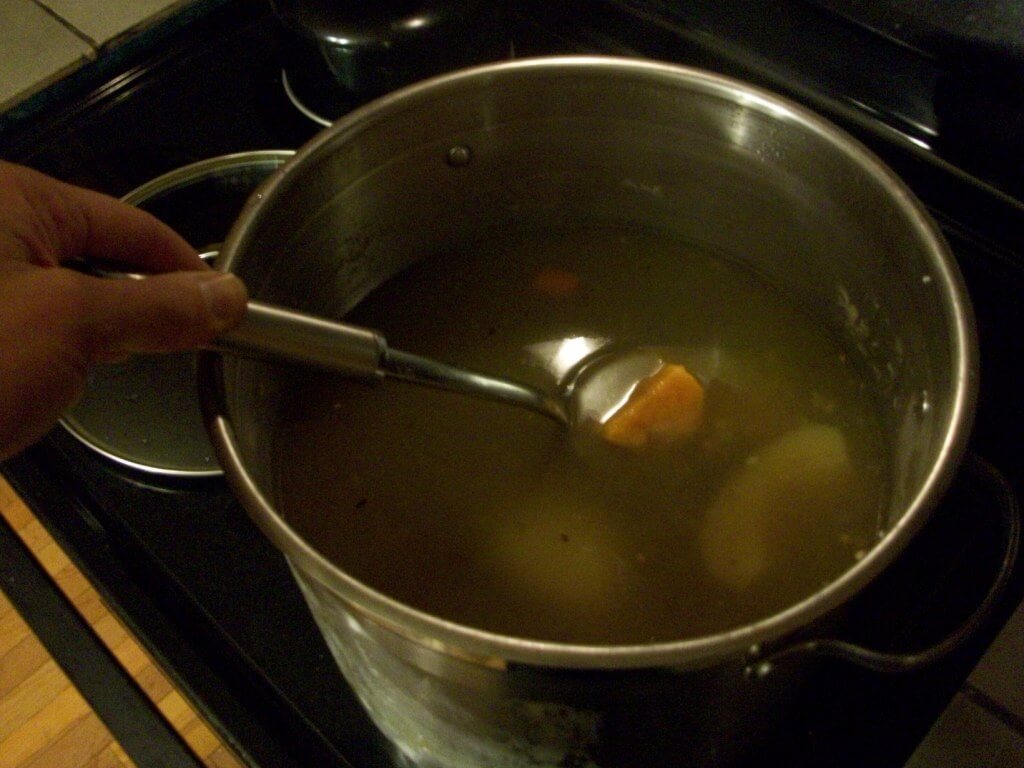Lessons In Making Soup

Three gallons of soup takes a bit of time to make, but it would be a small portion of the total time that I would spend cooking for myself in one week. The hypothesis was that if I could spend less time making food for myself then perhaps I could spend more time making guitars for other people - a very testable and perhaps even logical idea. And although the idea might carry a great opportunity for better time management, there were risks present that are inherent to every venture in bringing a product to the production / batch making stage. These risks included any number of the possible senerios that would delete the usability of the soup and thus leave me with three gallons of waste water that would possibly be usable as fertilizer as early as July. I could have dropped the soup, somehow spilling it on the floor, the many ingredients swimming in all directions, ruining all hope of recovery with the 5 second rule, save perhaps a couple of dumplings. I could have tainted the soup by adding to much broth or any other number of seasonings leaving me with three gallons of something that tastes very bad.
I actually celebrated with a fine meal that night. It was a great success - a very tastey pot of chicken soup that would ensure a week of better focus and good eating. Of course I knew that it would taste good. I had made this soup enough times that fear of failure was absent. I don't know where I heard it. I think that it was from my stepmother. Whenever the idea was planted in my mind, it had become a part of my conscience - the culinary angel on the shoulder ( let's pretend he looks like the Swedish Chef from the muppets ) telling me not to place a boiling pot of soup in the refrigerator.
I was going to wait until it had reached a luke warm temperature before refrigerating the soup. It was about midnight when I went back into the kitchen and checked its temperature. Still damn hot. Obviously it wouldn't hurt to leave it overnight, right?
The next day I had some of my soup for lunch and something just wasn't right. I knew that it surely didn't taste as good as it did the night before when it was fresh off the stove, but couldn't believe that it had somehow gone bad in such a short amount of time, so I kept eating it, trying to believe that there was something wrong with my taste buds and not the soup. It was akin to that time I dropped a beautiful guitar that I had just completed while prepping it for a customer. I stook there looking at the guitar, thinking that I could rewind (sorry for the analog reference ) or hit "control z" and go back to the time when it was sitting on my work bench in perfect condition. Nothing was going to change it - the soup tasted like crap, and my stomach was starting to talk some sense into my taste buds, telling them to start doing their job.
I am not sure exactly what caused the soup to go bad so quickly, but I just cooked another batch and placed it in the frig without hesitation. Maybe I'll melt the refrigerator, but I don't want to waste the large quantity of soup ingredients once again.
It made me think about making guitars in batches and how there is a point in the process where each instrument has to be dealt with on an individual basis. I think that this production mindset is the real hurdle to being more successful at any kind of manufacturing. As we get more experience in making soup or in making guitars, we can be more efficient in creating a batch and the financial risks of tainting a batch won't ruin you. In the beginning there are many variables that one must learn to control and although the price tag on a mistake can be just as costly, its impact runs much deeper.
